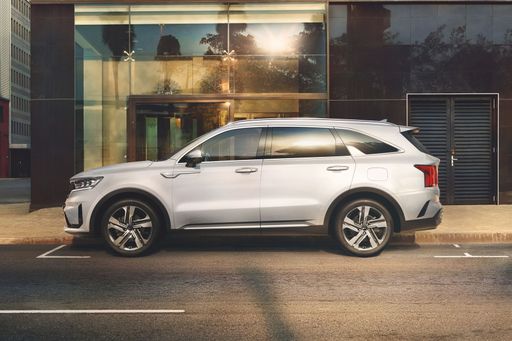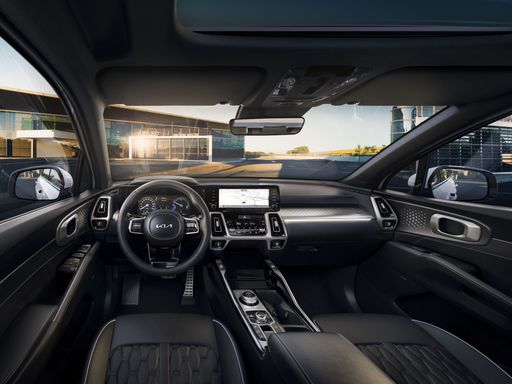Kia Sorento vs Toyota Prius – Differences & prices compared
Compare performance, boot space, consumption and price in one view.
Find out now: which car is the better choice for you – Kia Sorento or Toyota Prius?
The Kia Sorento (SUV) comes with a Plugin Hybrid, Full Hybrid or Diesel engine and Automatic transmission. In comparison, the Toyota Prius (Hatchback) features a Plugin Hybrid engine with Automatic transmission.
When it comes to boot capacity, the Kia Sorento offers 705 L, while the Toyota Prius provides 284 L – depending on how much space you need. If you’re looking for more power, decide whether the 252 HP of the Kia Sorento or the 223 HP of the Toyota Prius suits your needs better.
In terms of consumption, the values are 1.60 L per 100 km for the Kia Sorento, and 0.50 L for the Toyota Prius.
Price-wise, the Kia Sorento starts at 46000 £, while the Toyota Prius is available from 39400 £. Compare all the details and find out which model fits your lifestyle best!
Kia Sorento
The Kia Sorento is a versatile SUV that seamlessly blends style and practicality, making it an appealing choice for families and adventurers alike. With its spacious interior and thoughtful design features, it ensures a comfortable driving experience on both urban roads and country excursions. Additionally, the Sorento offers a suite of advanced safety technologies, enhancing peace of mind for its passengers.
details @ press.kia.com
@ press.kia.com
 @ press.kia.com
@ press.kia.com
 @ press.kia.com
@ press.kia.com
Toyota Prius
The Toyota Prius stands as a pioneer in the realm of hybrid vehicles, offering an eco-friendly driving alternative with its innovative technology. Its aerodynamic design and comfortable interior make it a practical choice for those looking to reduce their carbon footprint without sacrificing style. Additionally, the Prius boasts a reputation for reliability and efficiency, contributing to its lasting popularity among environmentally conscious drivers.
details @ Toyota
@ Toyota
 @ Toyota
@ Toyota
 @ Toyota
@ Toyota
 @ Toyota
@ Toyota

|

|
|
|
|
Costs and Consumption |
|
|---|---|
|
Price
46000 - 59300 £
|
Price
39400 - 45800 £
|
|
Consumption L/100km
1.6 - 7.2 L
|
Consumption L/100km
0.5 - 0.7 L
|
|
Consumption kWh/100km
-
|
Consumption kWh/100km
-
|
|
Electric Range
55 km
|
Electric Range
72 - 86 km
|
|
Battery Capacity
-
|
Battery Capacity
-
|
|
co2
37 - 174 g/km
|
co2
12 - 17 g/km
|
|
Fuel tank capacity
47 - 67 L
|
Fuel tank capacity
40 L
|
Dimensions and Body |
|
|---|---|
|
Body Type
SUV
|
Body Type
Hatchback
|
|
Seats
5 - 7
|
Seats
5
|
|
Doors
5
|
Doors
5
|
|
Curb weight
1854 - 2105 kg
|
Curb weight
1620 - 1630 kg
|
|
Trunk capacity
175 - 705 L
|
Trunk capacity
284 L
|
|
Length
4810 - 4815 mm
|
Length
4599 mm
|
|
Width
1900 mm
|
Width
1782 mm
|
|
Height
1695 mm
|
Height
1470 mm
|
|
Payload
455 - 684 kg
|
Payload
365 - 375 kg
|
Engine and Performance |
|
|---|---|
|
Engine Type
Plugin Hybrid, Full Hybrid, Diesel
|
Engine Type
Plugin Hybrid
|
|
Transmission
Automatic
|
Transmission
Automatic
|
|
Transmission Detail
Automatikgetriebe, Automat. Schaltgetriebe (Doppelkupplung)
|
Transmission Detail
-
|
|
Drive Type
All-Wheel Drive, Front-Wheel Drive
|
Drive Type
Front-Wheel Drive
|
|
Power HP
194 - 252 HP
|
Power HP
223 HP
|
|
Acceleration 0-100km/h
8.8 - 9.7 s
|
Acceleration 0-100km/h
6.80 s
|
|
Max Speed
183 - 201 km/h
|
Max Speed
177 km/h
|
|
Torque
367 - 440 Nm
|
Torque
-
|
|
Number of Cylinders
4
|
Number of Cylinders
4
|
|
Power kW
142 - 185 kW
|
Power kW
164 kW
|
|
Engine capacity
1598 - 2151 cm3
|
Engine capacity
1998 cm3
|
General |
|
|---|---|
|
Model Year
2024
|
Model Year
2023
|
|
CO2 Efficiency Class
B, E, F
|
CO2 Efficiency Class
B
|
|
Brand
Kia
|
Brand
Toyota
|
Kia Sorento
Unveiling the Kia Sorento: A Blend of Power and Efficiency
The Kia Sorento has firmly established itself as a reliable choice in the ever-competitive SUV market. In the 2024 model year, it continues to impress with a harmonious blend of power, efficiency, and cutting-edge technology. Excelling in versatility and innovation, the Sorento sets a high bar for its competitors.
Powertrain Options: A Drive for Every Preference
The Kia Sorento is designed to cater to diverse driving preferences with its extensive range of powertrain options. Whether you're inclined toward eco-friendly driving or dynamic performance, the Sorento offers a compelling choice. The plug-in hybrid models boast a combined power of up to 252 PS while maintaining impressive efficiency with a consumption rate as low as 1.6 L/100km. For those preferring a more traditional approach, the diesel variants provide robust performance with 194 PS, while hybrid options offer a balanced solution with a full-hybrid capacity.
Innovative Technologies for a Seamless Experience
At the heart of the Kia Sorento's appeal is its suite of innovative technologies, designed to enhance the driving experience. The automatic transmission, available across all variations, ensures a smooth and responsive drive. With both all-wheel and front-wheel drive options, it meets the demands of different terrains and driving conditions. Furthermore, the Sorento offers an electric range of up to 55 km, making it a strategic choice for urban commutes.
Performance and Efficiency: A Delicate Balance
Balancing performance and efficiency, the Sorento showcases Kia's commitment to sustainable mobility without compromising driving pleasure. Accelerating from 0-100 km/h in just 8.8 to 9.7 seconds, this SUV offers agility and responsiveness. Maximum speed ranges from 183 to 201 km/h, delivering performance that rivals sporty counterparts. Meanwhile, CO2 emissions are kept smartly in check with ratings from 37 to 174 g/km, underscoring its eco-conscious design.
Spacious and Versatile Interior Design
Inside the Kia Sorento, comfort meets practicality with seating arrangements ranging from 5 to 7 seats. It caters to families and adventurers alike, offering a generous boot space of up to 705 litres when configured for maximum cargo capacity. Thoughtful details enhance the driving experience, including a well-designed dashboard, intuitive infotainment systems, and premium materials across various trim levels such as Vision and Platinum.
Safety and Technological Features
Safety is paramount in the Kia Sorento, with advanced driver-assistance systems providing peace of mind on the road. From adaptive cruise control to lane-keeping assist, the Sorento is packed with features ensuring driver and passenger safety. Additionally, the infotainment system supports seamless connectivity options, such as smartphone integration, keeping occupants entertained and informed throughout their journey.
Conclusion: Shaping the Future of SUVs
The Kia Sorento continues to redefine expectations in the SUV segment, thanks to its blend of sophistication, performance, and technological prowess. With its environmentally conscious powertrains and advanced features, the Sorento is not just a vehicle; it's a forward-thinking mobility solution that aligns with contemporary lifestyles, making it an ideal choice for drivers with varying needs and aspirations.
Toyota Prius
The All-New Toyota Prius: Revolutionising Efficiency and Performance
The Toyota Prius, a name synonymous with hybrid innovation, has once again shown why it remains at the forefront of eco-friendly automotive technology. The latest models have enhanced technical features and innovations, setting new standards for efficiency and driving experience.
Hybrid Performance: A Leap Forward
The latest Prius models employ a sophisticated 2.0 litre Plug-in Hybrid system that flawlessly melds petrol and electric power. With a power output of 223 PS, it propels the Prius with impressive dynamism, reaching 0-100 km/h in just 6.8 seconds. This performance-oriented aspect of the Prius does not compromise on efficiency, with an astonishing fuel consumption ranging from 0.5 to 0.7 L/100km.
Electric Range and Efficiency
One of the key highlights of the new Prius is its substantial electric-only range. Depending on the variant, it can travel between 72 to 86 km on electric power alone, making it an ideal choice for urban commutes where zero emissions are preferred. The hybrid system's CO2 emissions are remarkably low, between 12 and 17 g/km, contributing to its CO2 Efficiency Class B rating.
Engineering Excellence with CVT
The Prius is equipped with a state-of-the-art Continuously Variable Transmission (CVT), ensuring a smooth and efficient drive. This advanced transmission supports the front-wheel-drive layout, delivering power seamlessly and enhancing driving pleasure without sacrificing fuel economy.
Stylish Design and Comfort
Designed as a sleek five-door hatchback, the Prius offers a comfortable and spacious interior with seating for five passengers. It measures 4599 mm in length, 1782 mm in width, and 1470 mm in height, offering a practical balance of size and comfort. The boot space, while tailored for the hybrid battery, still provides a decent 284 litres of storage.
Cost Efficiency
The running costs of the Prius are competitive, with monthly expenses estimated between €1064 and €1188, and cost per kilometre ranging from 42.6 to 47.5 cents. Its efficient design results in a maximum speed of 177 km/h and a practical fuel tank size of 40 litres, ensuring less frequent stops on longer journeys.
Conclusion: The Prius Legacy Continues
The Toyota Prius continues to lead by example in the realm of hybrid technology. Combining impressive power with unmatched efficiency and a sophisticated driving experience, it is clear that the Prius remains a compelling choice for the environmentally conscious driver. Its innovative features and favourable cost metrics only bolster its appeal in the modern automotive landscape.
The prices and data displayed are estimates based on German list prices and may vary by country. This information is not legally binding.
